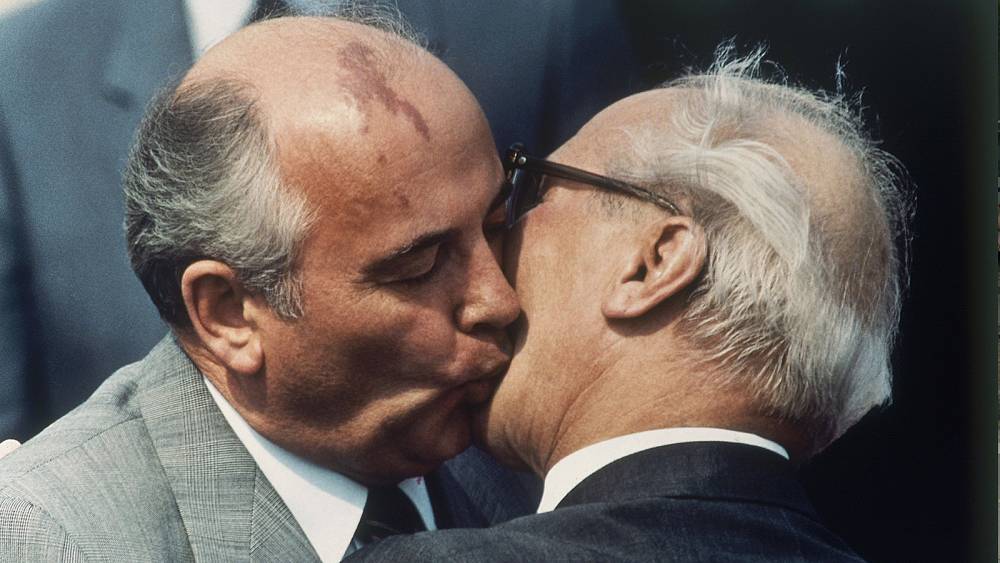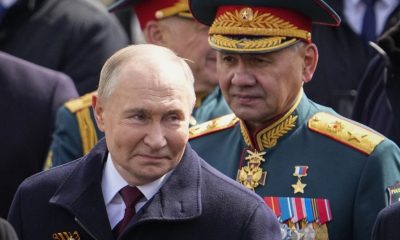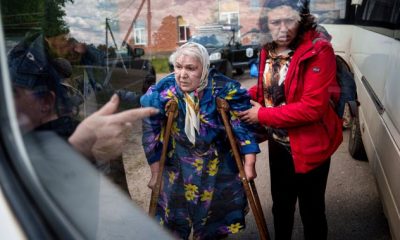General News
‘He died a disillusioned man’: How Gorbachev’s dream of liberal, European Russia failed

The demise of Mikhail Gorbachev, the eighth and remaining president of the Soviet Union, has sparked as a lot debate and divisions as his actions did throughout his lifetime.
For many of Europe and the West, the 91-year-old Gorbachev will likely be remembered for his time on the helm of the waning socialist superpower and for steering it in the direction of a liberal reform agenda.
For nationalist Russians, he’ll at all times be reviled because the perpetrator for the demise and breakup of their wonderful Soviet communist empire.
Elected Soviet chief in March 1985 at 54, the kid of Russian and Ukrainian peasants rose from humble beginnings in the course of the Stalinist interval to the very prime of the Communist Social gathering.
His insurance policies of perestroika, that means restructuring, and glasnost, that means openness, led to a thaw between the 2 foremost Chilly Conflict blocs that had been on the point of warfare because the defeat of Nazi Germany in 1945.
Debates round his legacy are significantly related on the present second when Russia is concerned within the invasion of its neighbour — a neighbour whose independence Gorbachev didn’t intrude with in 1991.
How did Gorbachev affect right this moment’s Europe?
Mikhail Gorbachev eschewed the Soviet Union’s rigidly centralised legacy, aiming to reverse the stagnation skilled in the course of the rule of Leonid Brezhnev, and finally grew cautious of communism altogether.
However it was not till the late Eighties that his need for peace shone by amid main home upheaval, particularly within the USSR’s member states.
Selecting to let the Iron Curtain fall freely — which paved the best way for the independence and democratisation of a variety of Europe’s previously socialist and communist societies — went in opposition to the expectations of the West that the Soviets would cling to the rungs of energy even by violence, stated Professor Vladislav Zubok, who lectures on worldwide historical past on the London Faculty of Economics.
“Gorbachev needed to open up the nation and he seen the Soviet Union as a part of Europe, a part of the trans-Atlantic neighborhood, not one thing against it,” Zubok stated. “And he contributed most to a brand new European actuality by not doing something, simply speaking.”
“One factor that he talked about that was becoming for the temper on the time, the temper of sudden pleasure, exhilaration, liberation — one thing that was very intangible however very profound at that second — was when he started talking a couple of frequent European house.”
Gorbachev’s notion of the Russia-dominated Soviet Union belonging along with the remainder of Europe got here with no expectations that Moscow could be the one dominating the relations by drive or dictating the phrases, both.
“That was thrilling and just about unbelievable as a result of it got here from the final secretary of the Communist Social gathering,” Professor Zubok, who has authored a number of books concerning the Soviet Union and its remaining days, defined.
“His design was to attempt to fastidiously cultivate the Soviet Russian imperialistic impulses and to deliver Russia, step-by-step — at the moment, not a state however the core of the Soviet empire — nearer and pull it into Europe.”
“This was meant to alter that a part of dependency that Russia had prior to now, of being both of Europe’s empires or opposing Europe as one of many empires,” Zubok informed Euronews.
Though his pan-European sentiments had been vaguely formulated and largely meant for international consumption, based on Zubok, his need was real, and the designs had been grand.
But the mixture of a shattered financial system that was in shambles even when he got here to energy, the rise in crime and unemployment, and the mass impoverishment all spelt bother at house.
Exterior of Russia, Soviet member states and satellites alike had been shortly transitioning to some type of independence and liberal democracy.
First, it was Poland, the place the Solidarność motion scored an unprecedented victory within the nation’s first democratic elections in June 1989.
This resulted in fears that Gorbachev might use drive to revive its communist authorities — however that didn’t occur. Then the Berlin Wall famously fell in October 1989. Gorbachev and the Kremlin once more did nothing.
“That disappearance of worry was one thing virtually intangible, proper? You would consider it or not,” stated Professor Zubok.
With strain on Gorbachev rising, issues did take an unpleasant flip, with the independence of the Baltic states — Lithuania, Latvia and Estonia — being the straw that broke the camel’s again.
In January 1991, a violent crackdown was launched in Lithuania, the place the Soviet navy killed 14 and injured one other 140 in an try to forestall it from leaving the USSR over the course of three days, and left an enduring stain on his picture as a pacifist.
However based on Zubok, Gorbachev was an outlier regardless. Even Brezhnev, who didn’t shrink back from utilizing drive in Czechoslovakia in 1968 and Afghanistan within the Eighties, thought of himself to be a peacemaker.
But Gorbachev brazenly rejected the so-called Brezhnev Doctrine, whereby the Soviet Union had the suitable to intervene in different socialist or communist nations if there was a direct risk in opposition to these in energy.
“Gorbachev was in control of essentially the most violent political drive on the planet, the Communist Social gathering of the Soviet Union,” Zubok stated. “He used drive, however later he at all times stated he didn’t need to do it, ‘it was imposed on me by darkish forces’, reactionaries, stuff like that. So it’s a significant paradox of historical past.”
“Once more, it was a matter of perception. Some leaders mistrusted him, Thatcher trusted him, Bush Sr. at first stated he was all speak, then in June ’89 he stated ‘oh, Perestroika is Gorbachev.’”
“So, because the world started to understand that he wouldn’t use drive to cease adjustments, then the change was an avalanche,” Zubok concluded.
What did Gorbachev consider Ukraine?
Gorbachev was born in Privolnoye, Stavropol Krai or within the Russian Soviet Federative Socialist Republic. On the time, Privolnoye had an evenly break up ethnic Ukrainian and Russian inhabitants, one thing Gorbachev evidently grew to consider was regular.
“Gorbachev was himself of blended ethnic origins, Ukrainian-Russian, and till the final second he couldn’t consider that Ukraine could be separate from Russia,” Zubok explains.
He noticed Leonid Kravchuk, the primary chief of Soviet Ukraine who additionally died in Might of this 12 months, and Boris Yeltsin, Kravchuk’s Russian counterpart, as “harmful opportunists” who fanned the flames of ethnic nationalism amongst their respective populations.
“They had been pitting the 2 individuals in opposition to one another. ‘How got here can my family members residing in Ukraine be out of the country?’, he stored exclaiming,” stated Zubok.
The logic of nationalism, which is on the coronary heart of the continuing invasion of Ukraine right this moment, was not one thing Gorbachev accepted as an inevitability.
“Many, many Russians form of stored pondering like him, so when hastily Ukraine started to say, ‘I’m not Russia, I cannot do that, I cannot do this,’ there was a lack of expertise,” concludes Zubok.
How do Russians understand his legacy?
Whereas the West noticed Gorbachev as a visionary who was prepared and able to ending the Chilly Conflict — rewarding him for his efforts with a Nobel Peace Prize in 1990 — for many Russians, he was an incompetent determine at greatest.
At worst, he’s seen as a traitor that destroyed a rustic they had been so happy with, Sergey Radchenko, the Wilson E. Schmidt Distinguished Professor on the Johns Hopkins Faculty of Superior Worldwide Research informed Euronews.
This dissonance is the results of divergent historic views, Radchenko argued.
“For the West, the top of the Chilly Conflict was a second of pleasure. It signified the triumph of Western values, the triumph of freedom, of democracy, the dismantling of the Iron Curtain,” he stated.
“That additionally might have been the message for the overwhelming majority of Russians. Nevertheless, issues didn’t go nicely for them as a result of with these freedoms additionally got here nice financial hardships that had been occasioned by the Soviet collapse.”
“And lots of Russians blamed these issues on Gorbachev though, in all fact, he wasn’t liable for them as a result of the system he inherited had deep flaws and a few would argue was in some ways unreformable,” Radchenko defined.
Through the remaining months of the USSR, Gorbachev was a sufferer of a failed coup, finally ousted by the primary Russian President Yeltsin, who shut down the Communist Social gathering, organized the dissolution of the Union, and informed Gorbachev to resign and vacate the Kremlin by the top of 1991.
The rise of President Vladimir Putin on the flip of the millennium, whose poisonous nationalist beliefs and tendency for historic revisionism solely highlighting Russia in a optimistic gentle, led to solely essentially the most enlightened Russians understanding and appreciating Gorbachev’s contributions.
But most fail to grasp that Gorbachev didn’t need to see the Soviet Union disintegrate in any respect, Radchenko explains.
“He didn’t need the dismantling of the Soviet Union. He needed to reform the Soviet Union. And as soon as he realized his financial reforms weren’t delivering, he then pursued political ones with a purpose to break the logjam and do it the short means,” he defined.
“This was completely different from the Chinese language who, as Deng Xiaoping put it, pushed for reforms by ‘crossing the river by feeling for the stones.’”
“Properly, Gorbachev would have none of that. He would leap into the river and see how briskly he might swim.”
Can Gorbachev’s dream of Russia as a full-fledged democracy ever come true?
In the long run, the issue with the reforms was that they had been determined upon by these on the prime of the political pyramid, with little or no buy-in from the underside.
“That’s the elemental drawback of this complete reform expertise. It misplaced legitimacy within the eyes of the general public, and the general public started to hunt and lengthy for a robust chief who would rule with a robust hand, in order that’s the place I feel we ended up now,” Radchenko defined.
As soon as Putin correctly acquired maintain of energy within the nation, he returned to the politics of dominating by violence, involving Russia in a collection of wars and conflicts, together with Chechnya, Georgia and Ukraine.
In the meantime, Gorbachev was largely forgotten, with the information of his demise in a government-run hospital in Moscow formulated in a curt and matter-of-fact method, “after an extended and tough sickness.”
“I feel Gorbachev died a disillusioned man. He lived lengthy sufficient to see lots of his key accomplishments fully dismantled by Putin, and that’s not a contented place to be in,” Radchenko, a notable Chilly Conflict historian, stated.
“Who might he blame? The Russian individuals, I suppose, in that they proved so short-sighted and so blind as to not perceive, to understand the possibility that they got.”
“An opportunity that that they had not had and will not have for a lot of extra many years, and so they squandered it. So I suppose Gorbachev blamed the Russian individuals for failing to grasp what freedom is and failing to like freedom,” Radchenko defined.
And with the most recent act of aggression in opposition to its western neighbour Putin — and Russia together with him — grew to become pariahs as soon as once more, with most of Europe and the West isolating the nation politically and economically and equating it with ethical evil.
But Radchenko believes {that a} day will come when odd Russians will bear in mind Gorbachev’s legacy as they try to rebuild their society right into a full-fledged democracy that will likely be part of Europe in any case.
“I don’t suppose that there’s one thing particularly genetically fallacious with the Russians that they will by no means perceive the advantage of democracy, the advantage of freedom,” he stated.
“Different nations have handed by traumatic experiences and have additionally been referred to as unreformable — in fact, I keep in mind the Germans at the beginning — and but, they had been capable of overcome and put that have behind them and perceive their historical past a bit bit higher.”
“I hope Russia will transfer in that path. Primarily it’s a perform of a altering era […] in order time shifts, Russia may also change and have a distinct view of its personal historical past and maybe reinvent itself — however it is going to be a tough course of, judging by how tough it has been up to now,” Radchenko concluded.
























